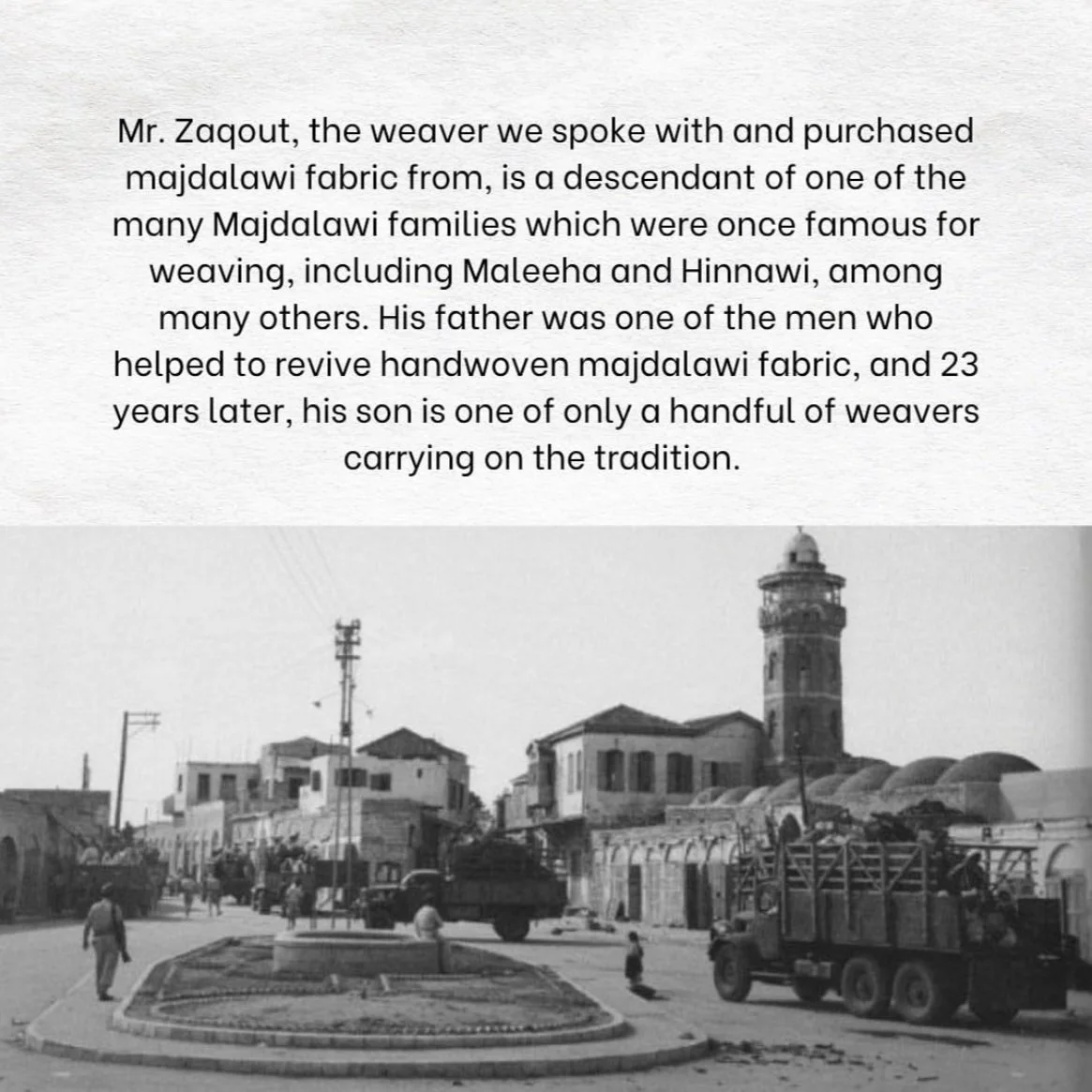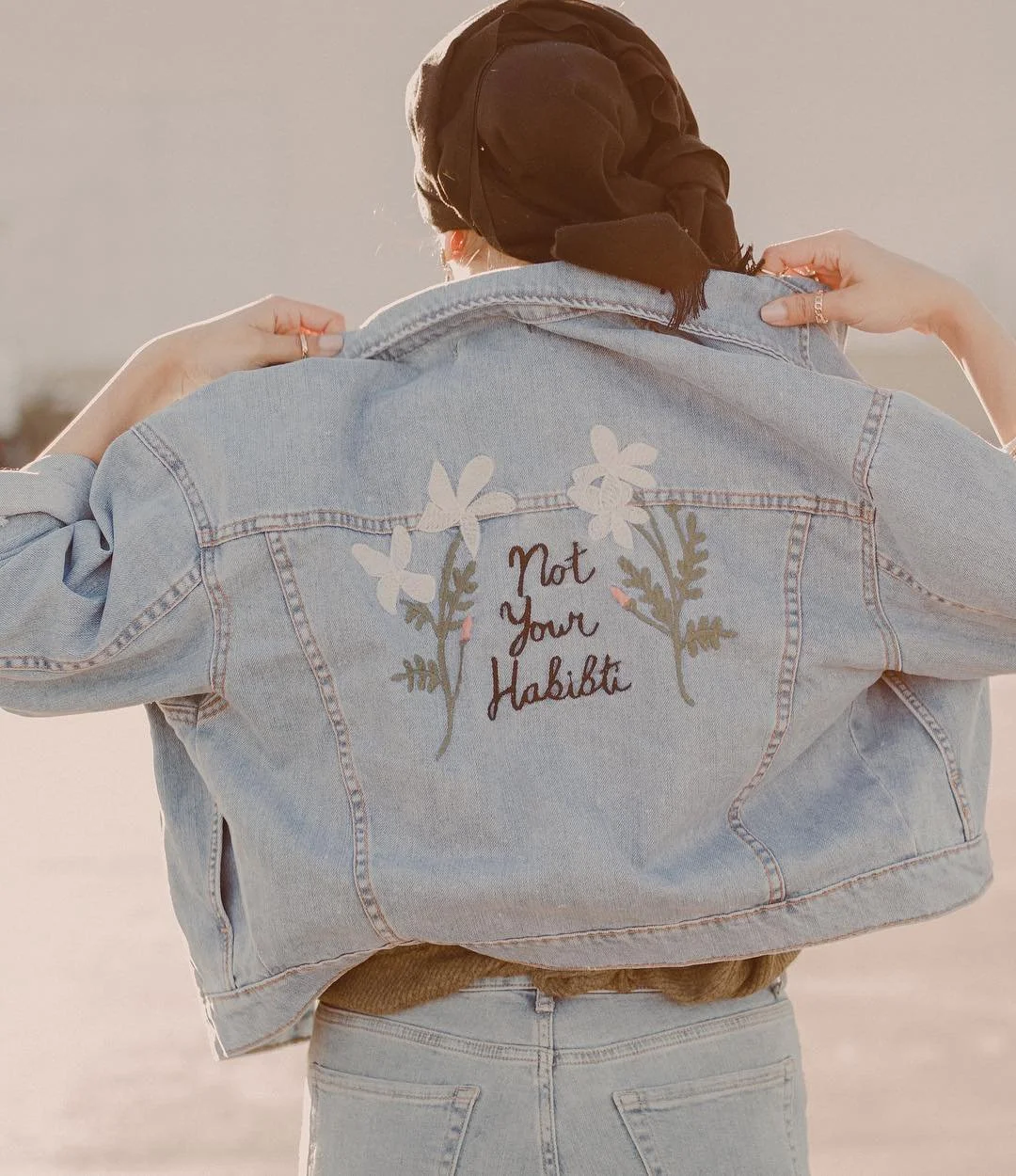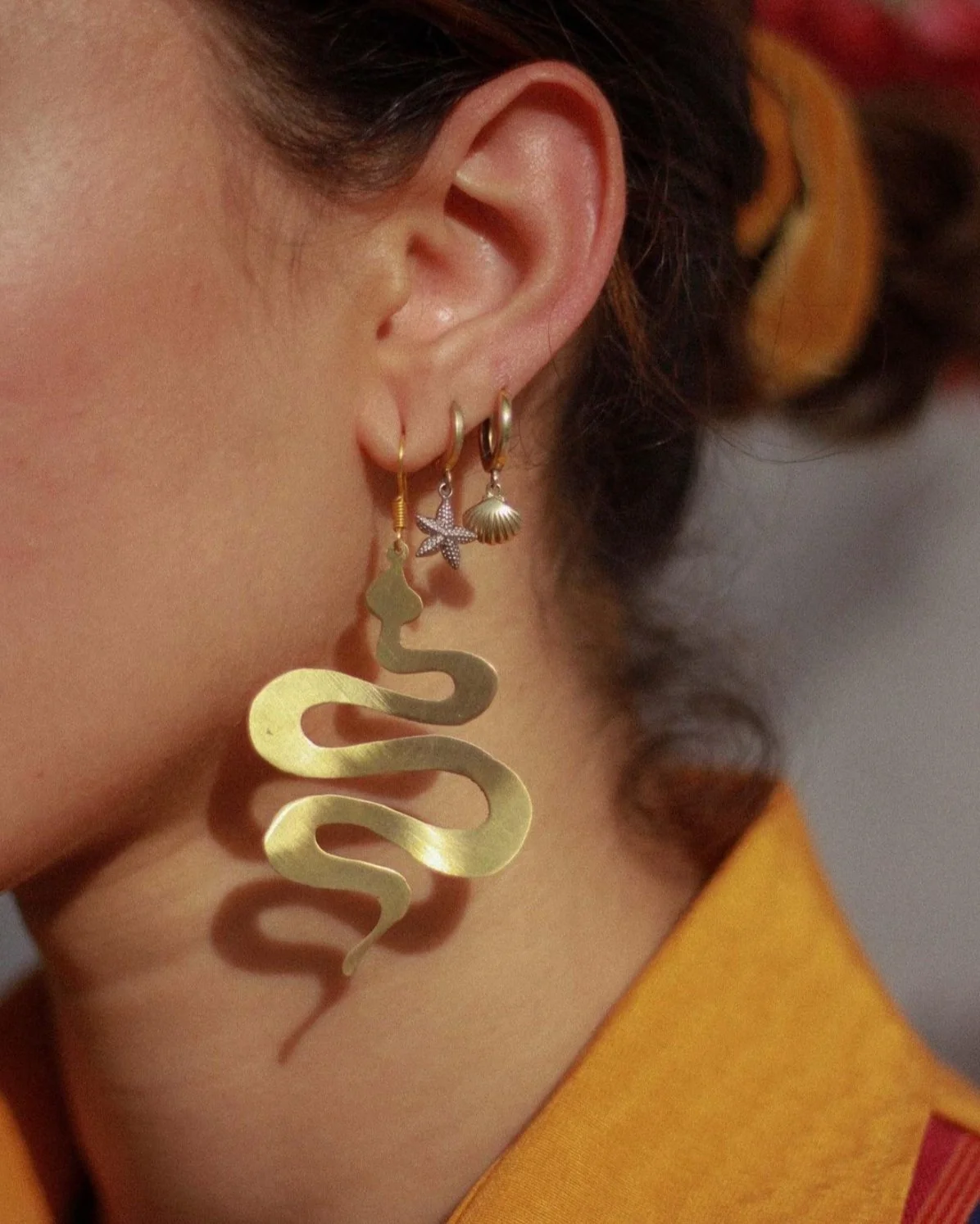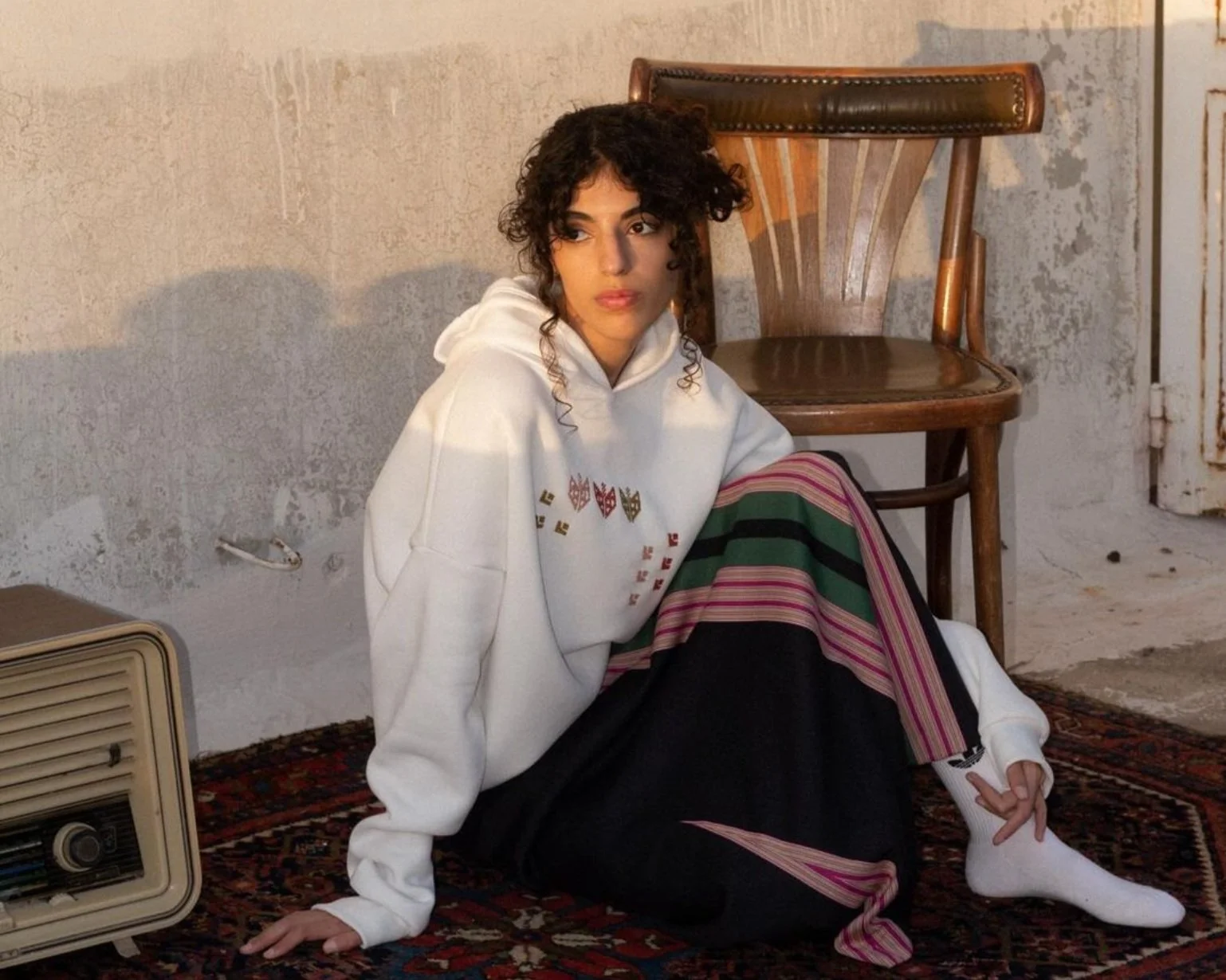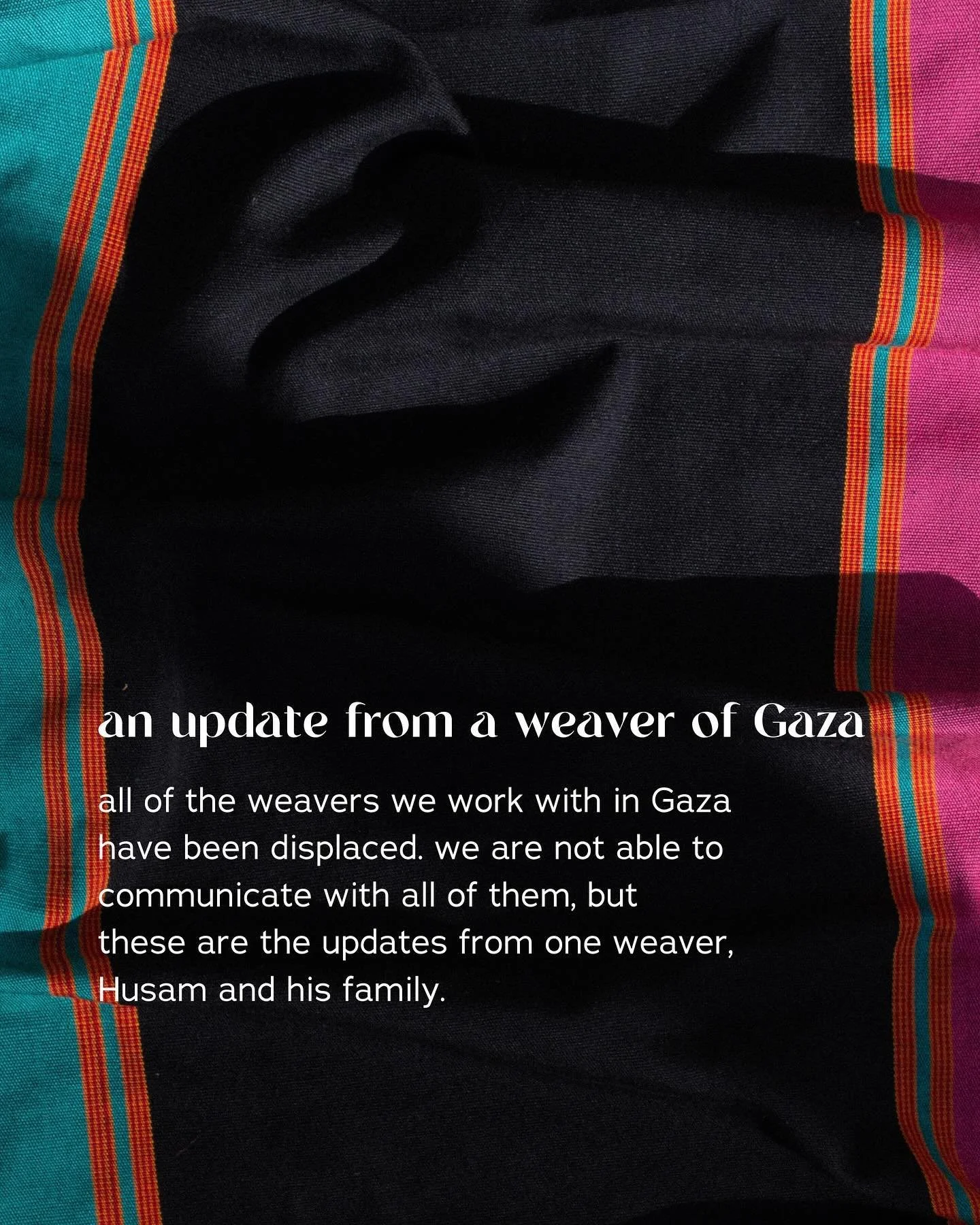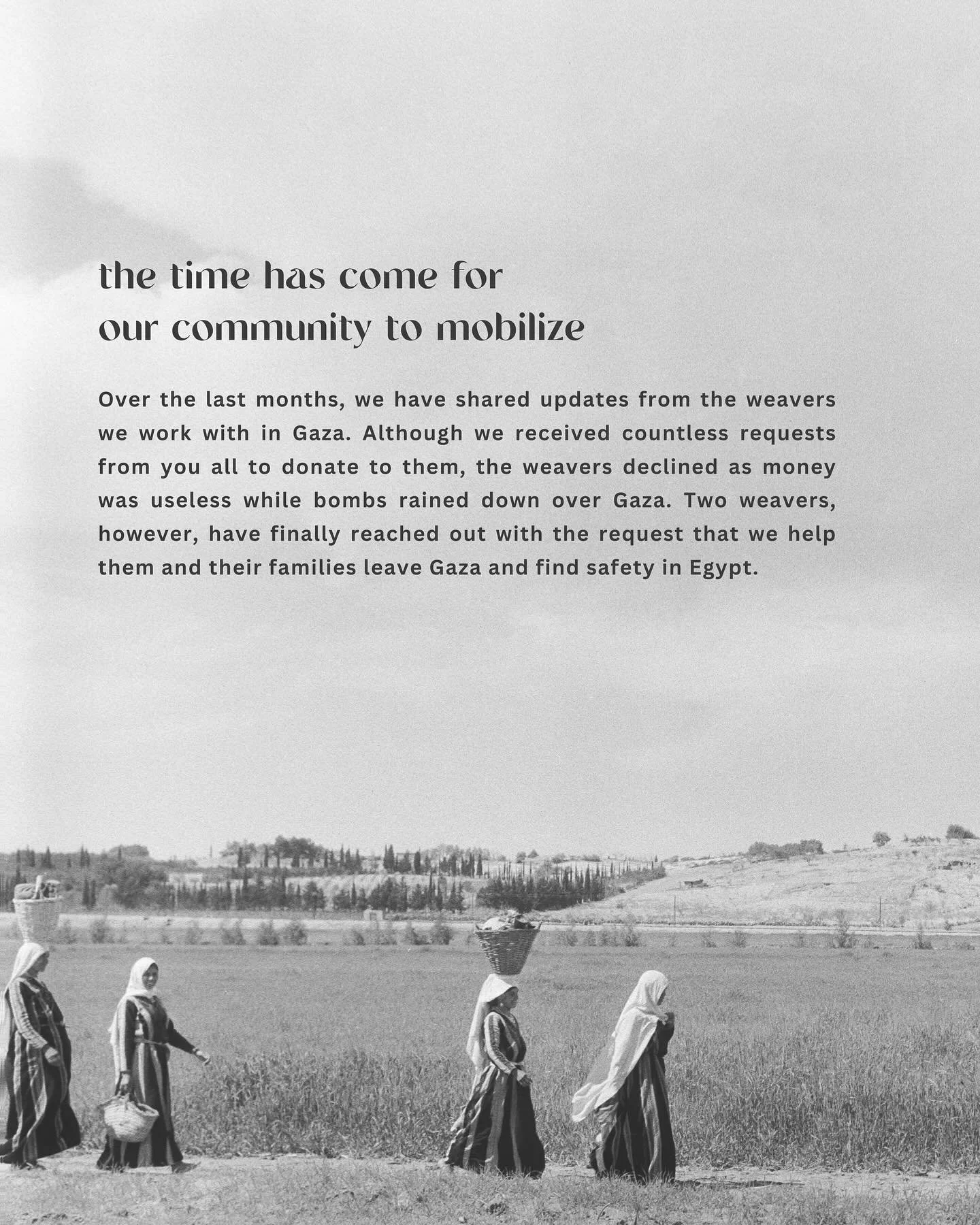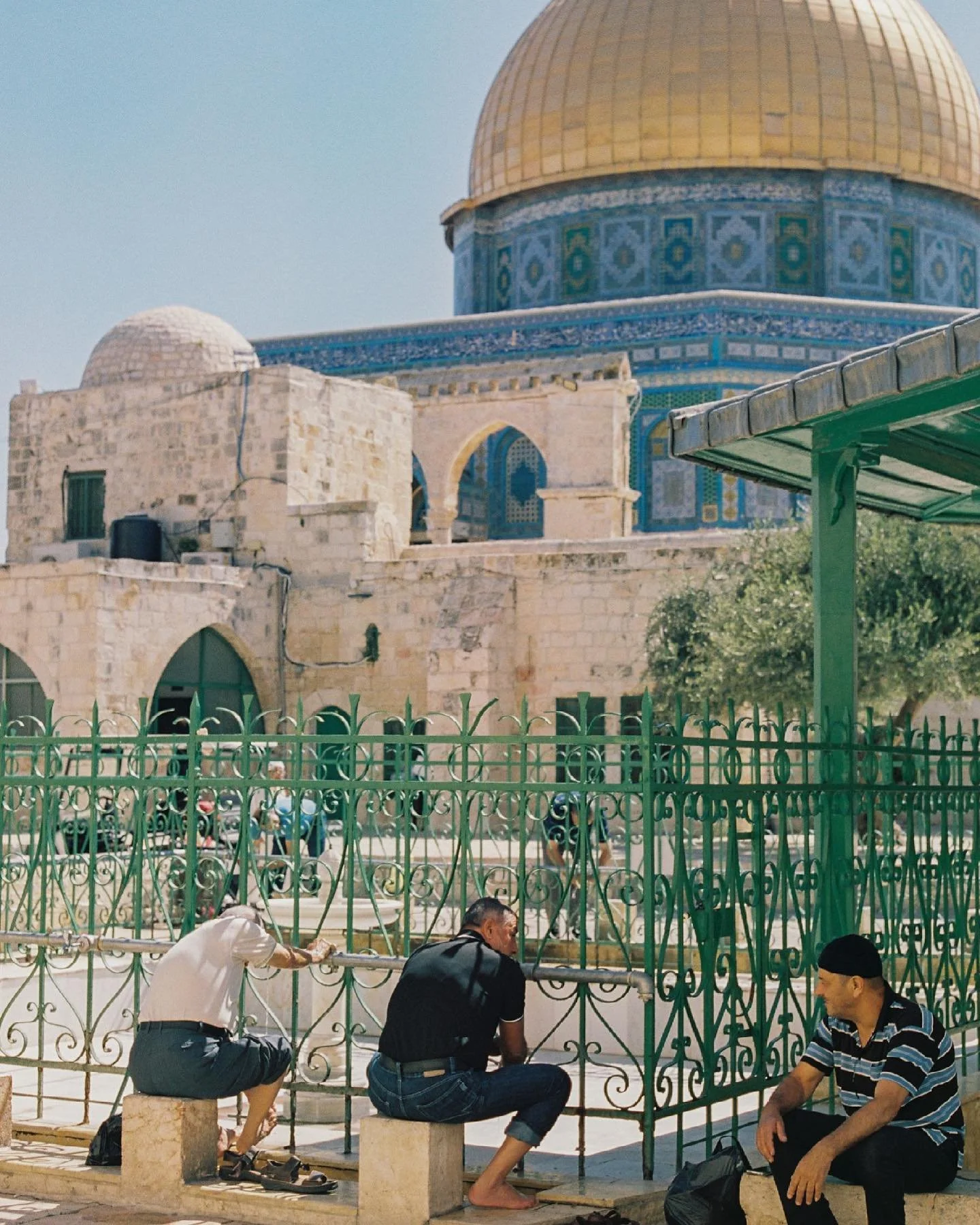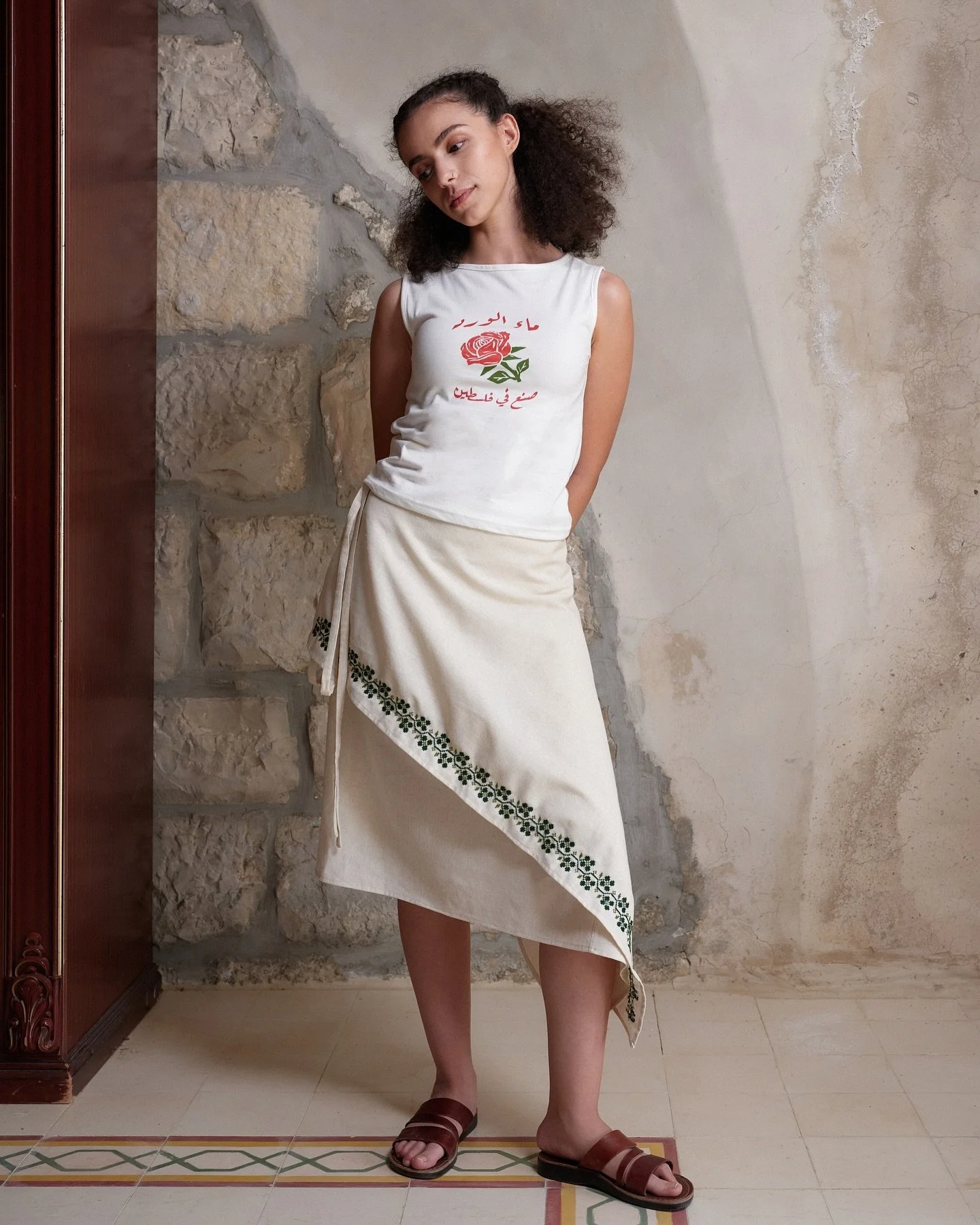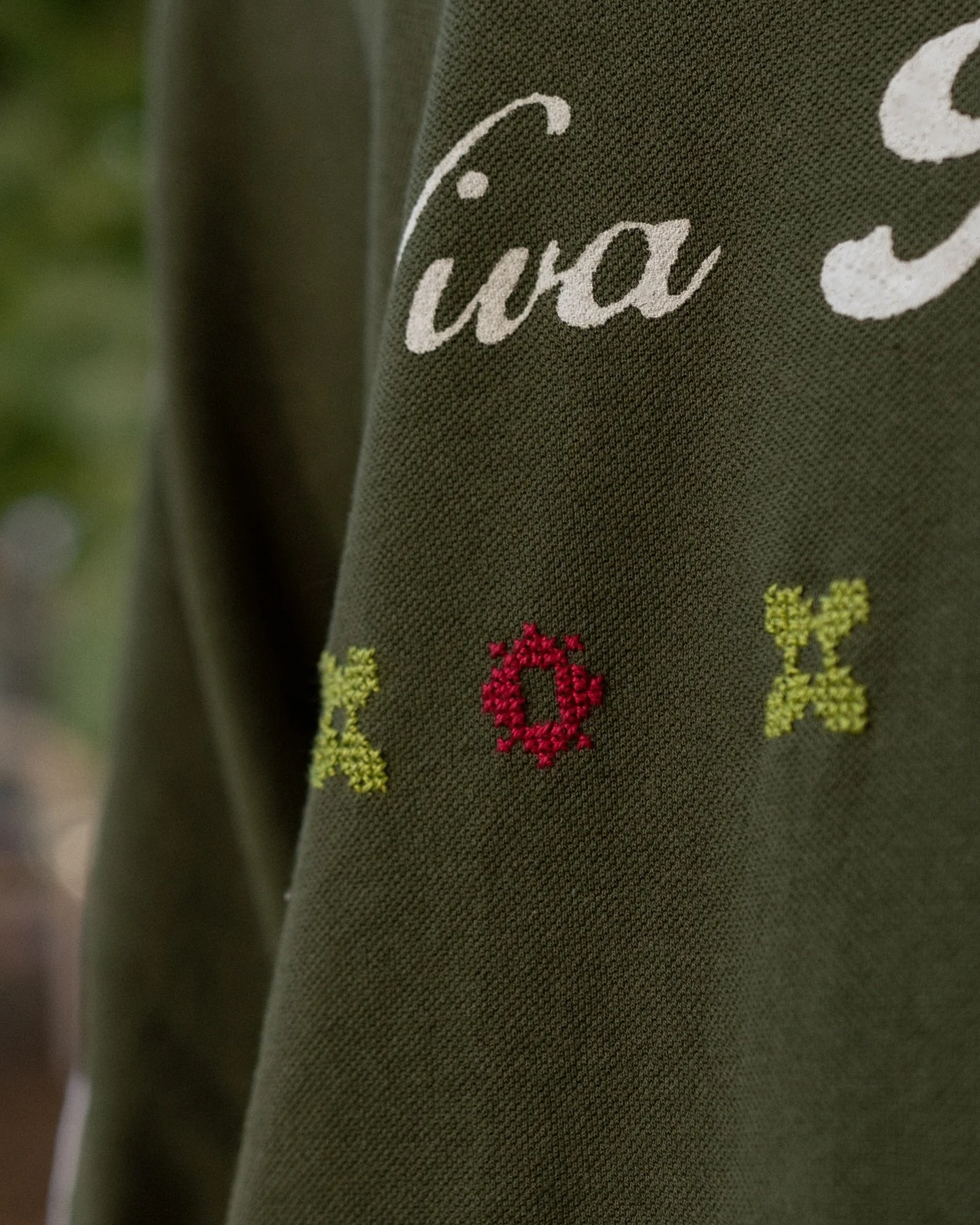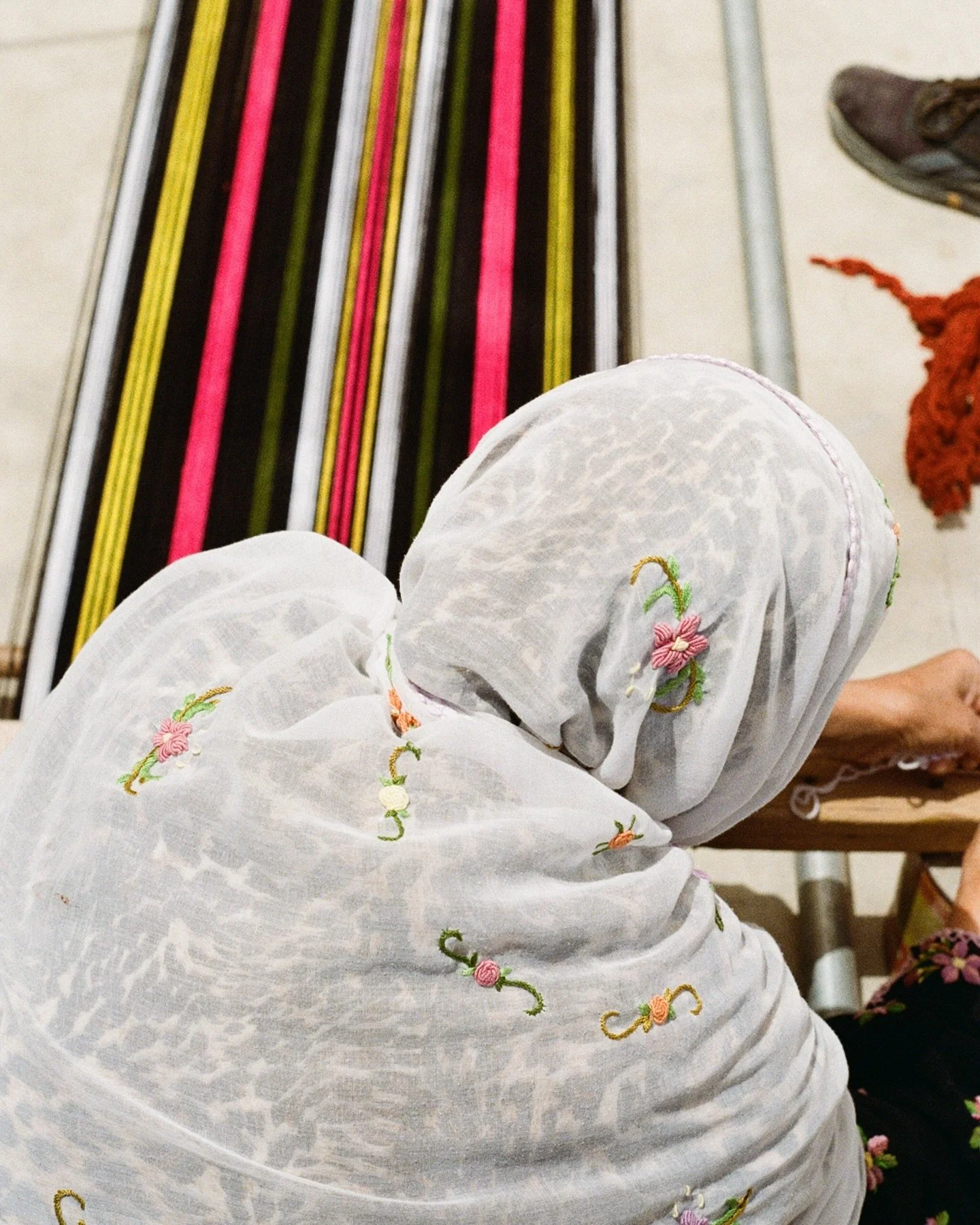Nöl Collective
After her initial brand, Baby Fist, Yasmeen Mijalli started Nöl Collective.
Baby Fist had been born out of her experience moving to the West Bank after growing up in America. Her evolution with Nöl Collective has proven to make it a shining example for any clothing brand.
The tone Nöl sets is not just in terms of the designs, which are plenty praiseworthy on their own, but also through their practices. The brand’s pieces are made locally, by Palestinians, in their homeland.
Mijalli develops relationships with these craftspeople and artisans, forming a true community that goes into each garment. She also shares their stories on Nöl’s Instagram, along with other education about Palestinian history and culture.
In addition, the traditionally slower process is also hindered by the occupation and apartheid rules enforced by Israel – making every aspect of production immensely more difficult. Yet they persevere and also set an example in sustainability during a time of high-rising global clothing pollution every year.
The brand has an undeniable embrace of Palestinian tradition and history, while also adding their own voice through creating and storytelling in a modern context. As Mijalli said herself, “It is building this collective within Palestine that I think traces our lineage, but also maybe takes it into the future.”
June 2023
Brand description:
heavy and colorful tatreez hailing from southern Palestine ❤️
July 2023
Brand description:
made in Palestine ❤️🔥 Razan jacket detail
April 2021
Brand description:
Embroidered with Jaffa neroli blossoms and Gaza carnations, this dress celebrates two of our costal cities, even if we can only imagine them (we all have green IDs which means we really can only imagine the sea 💔)
this romantic midi dress is featured in a puff-sleeved silhouette with tiered ruching detail for added shape.
dress is cut and sewn by Huda in her sewing workshop in Jenin 🧡
November 2022
Brand description:
tatreez on indigo linen 💙 made In Ramallah and Gaza
May 2024
Brand description:
made by a network of over fifteen women throughout Palestine who embroider each piece, supporting their families, their neighbors, and communities 💛 Made with love and pride
April 2023
Brand description:
um 7amdi chose this specific motif and we all spent the afternoon in her shop, surrounded by her intricate and richly embroidered dresses, embroidering these shirts. was still learning how to embroider and will never forget how the women laughed at how stiff I was, saying I looked electrocuted ahahaha. They took turns teaching me tips all afternoon. tatreez circles are community 💛
Yasmeen Mjalli’s parents grew up in a Palestinian farming town. However, they immigrated to the United States for her adolescence and she grew up in Greensboro, North Carolina.
The family would take annual summer trips to visit her grandparents and other relatives in Tubas, a city in the West Bank.
Her mom was very involved in their Palestinian community in North Carolina, so she would always bring Mjalli and her siblings to fundraisers and protests. While there was an understanding of an “occupation” that was a big deal, Mjalli didn’t understand the intricacies at that young age.
Within an American school system that was mostly white, having a different background – Palestinian, Arab, and Muslim – often left her feeling out of place.
Even just with food alone, she was told she was weird for bringing traditional Palestinian food like pomegranates instead of typical American snacks, not being able to eat pork like when Zaxby’s ham sandwiches that were ordered for the class, or fasting for Ramadan during lunch time. These kinds of moments, which extended outside of food as well, led to struggles to fit in and social frustration through her years of education.
Later, Mijalli attended the University of North Carolina, studying art history, and stared a Master’s program at Duke University where she concentrated on women in the Middle East – before she decided she was unhappy there and decided to leave for her family’s homeland.
“My mom and dad moved when they got married to the U.S. and they lived there for two decades,” she told Vogue in 2020. “They realized how Americanized their kids were becoming, and this huge imbalance between their American identity and their Palestinian identity.”
Her parents moved back, and soon Mijali did as well. They settled in Ramallah, where Mijalli started to also live after 2017, before later moving elsewhere in the West Bank.
“Sometimes I look back to who I was as a young girl and cannot recognize myself. Born to Muslim-Palestinian parents in the American south, I was a deeply angry child struggling with the pain of balancing (and failing miserably) two discordant worlds.
I could not understand why my mother refused to learn English, why she always reached for the Fairouz CD, why she always made makloubeh and warak dawali, even after I begged her to make meatloaf. Looking back, she knew the beauty of the people I could never understand until I moved back.”
July 2023
Brand description:
the Nawal tee: hand-embroidered with the traditional heart motifs hailing from the Naqab region of Palestine. Hand-embroidered by Um Ibrahim and her sister-in-law in Naqoura village 💛
February 2021
Brand description:
Amo made this jacket while telling me the story of his life and of how Ramallah’s textile heritage has largely become a thing of the past right before his very eyes. A man of 70 years old, he learned how to make clothes from his father, now running a second generation workshop. He watched how the fabric factories in Ramallah closed one by one until none were left, how more and more people are importing rather than producing locally, and matter-of-frankly told me that once he dies, the generation of tailors who know this textile history will come to an end soon thereafter.
Working with him, learning from him, and hearing his stories of the collective past is my honor and privilege. This linen duster is a manifestation of this man’s knowledge and love for the craft. It is my pleasure to share this with all of you 💛🤍
As always, Made in Palestine 🇵🇸
Augus 2023
Brand description:
the Razan jacket: made with hand-woven and cotton and made in Askar refugee camp. Features a tatreez pocket detail ❤️🔥
Worn here with the hand-embroidered Nasrin tank and Najla cargo pant
May 2023
Brand description:
Hand-embroidered linen. The Yara is an oversized, shirt (dress) with long sleeves. It features a structured collar, traditional hand-embroidered motifs of flowers and birds. Made in Ramallah, embroidered in Naqoura village 💛
April 2021
April 2021
Moving to Ramallah was a wake up call, and gave Mjalli a real understanding of what it meant to be a Palestinian on a daily basis in the West Bank. Part of this was the borders and treatment from Israeli soldiers, of course, but it also took adjusting to get to know Palestinian society.
This included reckoning with established codes of conduct, like how a woman’s actions were expected to be. Her kindness and friendliness, for example, were often interpreted as sexual advances. She stopped smiling, making eye contact, and started dressing more conservatively. Yet she quickly realized this made her profoundly unhappy to be so restricted in toning down her personality, expression, and decisions.
Soon after, Mjalli started making jackets with the slogan “Not Your Habiti” (Arabic for my dear / my love) to confront street harassment of women and for them to reclaim their own identities. This led to creating BabyFist, her initial clothing line, in April 2017.
January 2018 - A ‘Not Your Habiti’ jacket from the Baby Fist line
Mjalli also created a typewriter project with this idea, where she invited other women to come and share their own experiences of harassment and gender repression or discrimination.
Baby Fist expanded to a larger line, and eventually a shop in Ramallah, with clothes manufactured in Gaza. "I really think if you are going to produce clothing for a cause, it has to adhere to moral and ethical codes all around," Mjalli said at the time. This also helped provide jobs in Gaza, which then had a high unemployment rate.
That production decision caused ongoing challenges due to Israel’s blockade and military checkpoints. Yet when it took months for jackets to be shipped during the 2018 Great March of Return protests, Mjalli did not fret. Instead, she explained the reality to her audience and customers – making it a teaching moment. She said to Vogue:
“There is this demand for transparency and ethical production. When you order the clothes online, it comes in a plastic bag, at your doorstep, and you don’t have to think about the human chain that had to come together and bring it through your door.
We use the opportunity not only to humanize the process of clothing production, but to illustrate the political circumstances in how our clothing is produced, whether you are in Indonesia, India, or you’re in Palestine.”
Baby Fist also ran a Menstruation Education Campaign, hosting reproductive health workshops for girls in Palestinian public schools.
After three years, Mijalli out grew Baby Fist and wanted to start something different, more aligned with all that she had learned.
Thus, Nöl Collective was born in 2020.
January 2023
Brand description:
cut and sewn in Askar refugee camp on the outskirts of Nablus. the sewing workshop is run by three brothers originally from Lydda in occupied Palestine. Visits to their sewing workshop mean coffee, lunch, and their children (little Osaid is never shy to tell us his opinions about the fabric and design choices).
Our last visit to their sewing workshop took 5 hours as opposed to the 1 hour it normally takes because of the military roadblocks and checkpoints now set up. The normal route has been completed blocked off and Palestinians are now forced to take meandering and tedious back roads to reach the Nablus region. The check point forces people to wait hours just to pass, in our case we waited 3.5 hours to cross. Soldier would let a couple of cars pass every 10-15 minutes then go back to chatting just because they can. The thing about Palestinians, though, is we breathe life no matter circumstances. Everyone left their cars to congregate and chat, creating community to help pass the time. People who lived near the checkpoint even passed out sunflower seeds, pastries, tea, and coffee.
the Ansa jacket is made with dead-stock upholstery fabric and features a hand-embroidered tatreez collar.
July 2023
Brand description:
the camel motif failing from al Khalil region, hand-embroidered by Um Ibrahim and her sister-in-law in Naqoura village 💚💙
October 2020
Brand description:
made in Palestine 🇵🇸 we embroidered pomegranate and olive branches onto something a little unexpected. the embroidered pantsuit is in 💛 this blazer is featured in a boxy, cropped silhouette with embroidered pomegranate and olive branches along the hemline, the perfect homage to autumns in Palestine. the timeless pants are featured in a high-rise, wide-leg silhouette for goes-with-anything style from season to season. The blazer and pants can be worn together or separately with other pieces in your closet, for versatility and the perfect touch of uniqueness to any look.
February 2021
Brand description:
we remade our ‘Yaffa’ shirt in a plum color. this is exactly why I love working with dead stock fabrics, the limited quantities force us to re-create with what we have, pushing us to continuously re-imagine 💜
June 2021
Brand description:
After stumbling upon a photo archive of Palestine’s first original rock band, @al_bara3em, we met up virtually with @sam3an, the son of one of the band members, a podcaster, music writer, and director, to learn the story of the band, and design a collection inspired by their legacy. After learning the story of his father, uncles, and aunts, Sama’an set out to take the story public, shed light upon the al Bare’em’s legacy, and continue the intergenerational resistance art.
Meet the collection inspired by the cover-band-turned-psychedelic-rock-group that played to packed venues across Palestine in the 60s and 70s.
April 2021
Brand description:
the Yaffa shirt in lemon 🍋 made with Syrian cotton and mother-of-pearl buttons 💛
March 2021
Brand description:
Teta fixed Sido's trousers with some of her old thobs. These classic pants are featured in a staple, tapered-leg silhouette and relaxed fit for added shape. Features 30 to 40 year-old tatreez from fraying thobs tossed out or donated by their previous owners. We upcycled the fabric to give the tatreez a new life cycle
The word Nöl in Arabic (نول) means loom – a device used to weave cloth and tapestry. “Palestine has been popular in dyeing and weaving for centuries,” Mijalli wrote when announcing the name change. “The textile industry relied on manual looms.”
In November 2020, after the launch, Mijalli explained origin of the name to People of Colour Collective (POCC) Magazine:
“I had stumbled across a 1975 photo of a man on the Gaza beach. He had a cigarette dangling from his mouth and was surrounded by a halo of coloured yarns placed all around the beach. He had washed each roll of yarn in the seawater to stabilize the vivid blues, yellows, and reds.
Gaza, circa 1975. Photo by Thomas Abercrombie for National Geographic
Immediately I was drawn, asking myself what this man was doing and how I had never learned about anything even close to what he was doing. It was yet another part of our culture that I hadn’t learned about, yet became ravenous to know more.
Gaza, circa 1975. Photo by Thomas Abercrombie for National Geographic
After weeks and weeks of research, I had learned that these yarns had been dyed with plants and spices native to Palestine like indigo and sumac. The man on the beach was stabilizing the colours with seawater before the yarns eventually made their way onto a loom where they would be woven into the fabric for carpets, furniture, and clothing.
It was a deeply intimate relationship between the Palestinians and their land, a harmonious relationship only indigenous peoples know. I fell in love with the loom (which is the English word for Nöl) because it represented this collective process to create something beautiful, intentional, and sustainable.”
Gaza, circa 1975. Photo by Thomas Abercrombie for National Geographic
Mijalli also explained the process: The first stage was the preparation of raw material (camel's hair, sheep's wool, goat's gair), where the colors of raw wool were then separated from each other. The next step was drying, spinning, and converting to threads.
Those threads were sent for dyeing to turn into bright colors, which would then be washed with the sea water of Gaza to stablize the colors.
The dyes themselves were typically produced from local plants and insects. Examples include:
Red from pomegranate and madder root
Blue from the indigo plant
Yellow from grape leaves or saffron
Blue from walnut shells
Yellow-green from sumac
Villages were often associated with the use of specific colors and threads.
The threads were then woven into many things (with looms) such as carpets, gowns, horse saddles, children's swings, and more.
This type of education is an example of what Mijalli shares on the Nöl account on social media.
July 2023
Brand description:
The Nasrin tank is made in Bethlehem and features traditional hand-embroidery. Hand-embroidered by Um Ibrahim and her sister-in-law in their home in Naqoura village 🧡
April 2021
Brand description:
the Yaffa shirt in lemon 🍋 made with Syrian cotton and mother-of-pearl buttons 💛
May 2023
Brand description:
The Widad linen dress is featured in a flowy, square neck design with a drop waist and pleating for more volume. Features hand-embroidered heart motifs.
Made and hand-embroidered in Ramallah
April 2021
Brand description:
new earrings are in, hand cut in the homes of the women of Beit Duqqu cooperative 🧡 throughout the last year, the cooperatives’s usual space has been closed and we are immensely proud to have been able to keep working with them and support their beautiful work 🙏🏽
Just as she had kept production local for Baby Fist, Mijalli continued that for Nöl – but expanded to more areas across all of Palestine.
With Baby Fist, Nöl had worked with one factory in Gaza, though they were unable to meet them in-person due to the restrictions between traveling from the West Bank.
Mijalli decided to move away from only working with a factory setup – instead expanding so that Nöl could work with women cooperatives and smaller, family-owned businesses. This also expanded to include other locals from apothecaries and spice shops for natural dye agents to family-run tailor shops.
From Nabulus to Jenin to Gaza to Bethlehem to Ramallah, and more, the team is spread out across Palestinian towns. “I design and I'm coordinating, but at the end of the day, these people that I work with are bringing it to life,” Mijalli said.
The intentional approach ties to the Collective aspect of the name, that it takes a village to bring everything together, and ties to the idea of Nöl (a loom) as individual threads that make something bigger.
December 2020
December 2020
Site note:
The Nöl store in Ramallah, West Bank
April 2023
Brand description:
the three brothers who made this suit cursed me for how complicated it was 😂 this fabric, traditional Syrian fabric, is only 80 cm wide so that means cutting out the pieces for both a blazer and a pant and getting all of the lines perfectly even and aesthetically pleasing was so difficult!! But they truly are masters and I wouldn’t have trusted anyone else to bring it to life.
The Lila set features an oversized blazer and slouchy pant made with traditional Syrian fabric typically used in traditional Palestinian dress. Made by three brothers in a family owned and run sewing workshop in Askar refugee camp.
November 2022
Brand description:
featuring tatreez (traditional Palestinian hand-embroidery), the Shams hoodie is an oversized and cozy piece. Made in Bethlehem and hand-embroidered in Ramallah 💛
Palestinian tatreez (cross-stitch embroidery) is a centuries-old art form handmade by women in Palestine and traditionally passed down from mother to daughter.
February 2023
February 2023
Brand description:
spring ‘23 collection
December 2022
April 2023
Brand description:
the Aiza mini skirt, made with traditional Syrian fabric in a family owned-and run sewing workshop in Askar refugee camp: Paired here with the “made in Palestine” sweatshirt made in Bethlehem and embroidered in Ramallah 💙
Brand description:
for Vogue Arabia’s April 2023 print issue. Here Silai wears the hand-embroidered Lamia hoodie and the Najla cargo pant (made in Naqoura village and Askar Refugee camp)
Some traditional fashion conventions are simply not possible under occupation, such as creating and releasing collections at exact times of the year. However, Mijalli would not want to take this approach anyway.
In a 2021 TED Talk entitled The Sustainable Future Lies in Indigenous Tradition, she discussed the connection to a historical slower process that we can take note of:
“For generations, the West has invalidated and erased indigenous knowledge and ways of being. Knowledge which is deeply rooted in communication and active collaboration with Mother Nature. This type of relationship fostered a balance between us and the Earth...
It turns out that the world depends on this indigenous knowledge to protect a planet on the brink of disaster.
For example, traditional Palestinian embroidery is typically done in what we call Tatreez circles, in which embroiderers work together in a circle, often storytelling and singing, and each individual stitch is done by hand.
This means that some garments can take up to six months to complete. The garments often stay in our closets for decades, if not generations, passing from mother to daughter.”
February 2024
Brand description:
If your own home was under threat of erasure, what motifs would you embroider to keep its narrative alive?
In her TED talk, Mijalli also connects this to the excessive amount of clothing waste every year. According to the 2024 statistics, as much as 92 million tons of clothing currently ends up in landfills annually.
Along with this, she mentions the constant micro-collections that brands come out with, often as frequently as weekly. The same report from The Round Up offers other recent insights that include:
Between 80 and 100 billion new clothing garments are produced globally every year, as of 2024.
Textile production generates 42 million tons of plastic waste per year, making it the second-highest sector after packaging.
Almost 60% of all clothing material is actually plastic. Synthetic fibers that have become ubiquitous in our wardrobes.
Textiles and fashion waste account for 9% of annual microplastic pollution added to our oceans.
Only 20% of textiles are collected for reuse or recycling globally.
Only 1% of clothes will get recycled into new garments.
June 2021
Brand description:
tatreez and flowers on cotton 😩💛
June 2023
Brand description:
heavy and colorful tatreez hailing from southern Palestine ❤️
April 2023
Brand description:
the Nurul top & skirt set: intro to Majdalawi fabric, hailing from the Palestinian village of al Majdal.
This fabric is known for its colorful stripes and each colorway even has its own traditional name. It’s said that there were over 800 looms in the village at one point, collectively weaving enough fabric to cover the whole of Palestine.
The Nurul set is made with Majdalawi fabric hand-woven in an artisan workshop in Gaza. Cut and sew in a third generation sewing workshop in Ramallah.
January 2024
Brand description:
two embroidered variations of the cactus motif hailing from al Khalil and al Lydd. In Palestine, the cactus is a symbol of patience, steadfastness, and resistance. It demarcates the land and today acts as a living map of Palestine, marking where our now erased villages once stood. Cactus is extremely difficult to uproot and survives difficult circumstances, representing Palestinians’ tenacity and inherent connection with the land.
This sweatshirt, now sold-out, was hand-embroidered by Um Mohammad in the old city of Ramallah and was cut and sewn in a family-owned sewing workshop in Bethlehem.
July 2023
Brand description:
Um Ibrahim embroidering the Nawal tee in her home in Naqoura village 💛 not pictured: all her grandchildren playing around us
April 2022
Brand description:
a sneak peak into the amina shirt dress, made with dead-stock cotton/silk fabric and hand-embroidered in a women’s cooperative made up of over 60 women from Gaza to al Khalil. the silk embroidery in this belt features bethlehem moon star, a motif signifying the meeting between the moon and Asarte, the Canaanite goddess of fertility 🌙
In a fashion industry that makes profit a priority over people or the planet, like many other capitalist fields, Nöl stand apart. The ethical, sustainable, hyperlocal, and intersectional process makes Nöl an example of how things could be.
The logistical production issues from Baby Fist did not go away either, of course. In an October 2021 interview for the Dardashe podcast, she said:
“Israel controls all the entry points and exit points. So if you want to move goods and services, it has to go through Israeli authority and approval. And usually for Palestinians in the West bank, they pay double the tax.
It's essentially like shipping out of two countries without even choosing to, it's just by force. For example, during Israeli holidays, if their country shuts down, like there's no postal service, it also affects us.”
Mijalli also deals with having to take alternate driving routes, which can take two or three times as long – whether it be driving on the apartheid roads (since others are not accessible to Palestinians), going through Israeli military checkpoints, or even sometimes having to switch over to a bus instead.
Beyond these logistical intrusions, there are other serious issues that arise.
“One of the producers we work with who makes our sewing patterns, his nephew was murdered. And understandably we stopped production,” Mijalli said. “I think when you're buying a garment, you don't necessarily stop to think about what someone is experiencing specifically in Palestine, but for people all over the world.”
With Nöl, part of the goal is to look at the people behind the clothing as humans, not machines. Instead, Nöl aims to bring the people behind the clothes a voice.
March 2021
April 2021
Brand description:
Embroidered with Jaffa neroli blossoms and Gaza carnations, this dress celebrates two of our costal cities, even if we can only imagine them (we all have green IDs which means we really can only imagine the sea 💔)
this romantic midi dress is featured in a puff-sleeved silhouette with tiered ruching detail for added shape.
dress is cut, sewn, & embroidered in a third generation sewing workshop in Ramallah 🧡
March 2024
Brand description:
a labor of love: the Nasira bag is hand-woven in a women’s cooperative in the southern hills of al Khalil.
Master weavers, the women learned to shear, spin, dye, and weave wool from their mothers and spend their time passing on the knowledge to the new generation of women in the village.
Aside from the spinning and dyeing process, it takes them ten mornings to weave one bag. The rest of their days they are taking care of their families and their communities. Working outside of a factory and in the home means they choose their hours, prioritizing life over labor.
October 2022
Brand description:
the Layla vintage handwoven bag
The results of the clothing, despite all of these obstacles, are a testament to Mijalli’s perseverance. You can see this in the designs of the beautiful pieces, from the shirts to the dresses.
Along the way, those who follow Nöl are welcomed with continuous education about the patterns, materials, and overall cultural traditions of Palestine.
This storytelling appears in different ways. The slides that appear throughout this page showcase her skill in graphic design, for example. Or videos, such as one recent example posted on Nöl’s Instagram to give insight behind the brand’s Fairouz t-shirt, which gives a history of the Lebanese singer’s connection to Palestine, or a video on one of of the women who helps craft their tatreez designs.
Mijali also aims to incorporate stories of everyone she works with so people can know the garments all have a story. With Nöl, that means a specific Palestinian reality with each person. This includes sharing behind the scenes images and information – often on Instagram Stories or feed posts – as she documents different parts of the production process.
She regularly spends hours with the women’s cooperative, which has helped Mijali better understand the history of different patterns, colorways, and fabric choices.
August 2023
Brand description:
the Razan jacket: made with hand-woven and cotton and made in Askar refugee camp. Features a tatreez pocket detail ❤️🔥
Worn here with the hand-embroidered Nasrin tank and Najla cargo pant
September 2021
Brand description:
Made in Bethlehem, the “Anqa” shirt dress
November 2023
Brand description:
The plants and trees of Palestine are storytellers, just like us.
November 2023
April 2023
Brand description:
for Vogue Arabia’s April 2023 print issue. Here Lilac wears the naturally dyed Samira dress (made in Ramallah)
July 2023
Brand description:
the Razan jacket: made with hand-woven organic cotton and made in Askar refugee camp. Features a tatreez pocket detail ❤️🔥 Worn here with the hand-woven and hand-embroidered Farah denim pant
For the collective members who Mijalli works with, typically she meets every person before working together.
However, for the weavers she works with in Gaza, that again was not possible. Despite being only 50 miles apart, they talk over Whatsapp instead to communicate on process and designs.
Then, amidst the ongoing genocide in Gaza, their relationship took on a heightened role.
The families of two of Nol’s weavers – Hussam and Waleed Zaqout, brothers – were displaced amidst the bombardment.
Husam's home was destroyed and had nieces, nephews, friends, and neighbors all martyred.
His brother, Waleed, later found himself struggling with a failing kidney and in need of an urgent transplant.
They were also trying to evacuate both families, including wife and children. However, the Hala Agency – who was helping to evacuate people to Egypt – was charging large fees.
Mijalli helped to lead a campaign to raise funds for their evacuation, and the efforts were successful, with over $100,000 raised.
Eight people between the families were eventually able to evacuate to Cairo in March 2024, though four other family members were not able to go.
In more recent months, they also started another campaign for Help Gaza Weavers Preserve Majdalawi Textiles. (Click to donate now to the GoFundMe campaign.)
October 2023
December 2023
January 31, 2024
A few months before this latest ongoing genocide, Mijalli had spoken to The Guardian for a July 2023 feature:
“The goal is to keep storytelling more than anything else. I think that, up until now, fashion, and the garments, have been the medium through which we’re telling our stories about the Palestinian people, about the land, about sustainability and what that looks like for non-Western people especially.”
Mijalli is also a talented photographer. She often shares images taken around Palestine on the Nöl account as a way to further give context and insight into the land and culture. (You can see more photos on her personal account, @simsim.jpeg)
Through clothes, photography, or any medium she chooses – it’s clear that Mijalli’s storytelling and highlighting of Palestinian culture is at the heart of everything she does.
Another quote from the 2023 feature in The Guardian was:
“I always say living here, it's like heaven and hell. It's this simultaneous, bittersweet state of being. You have the heaven of Palestine – like the people, our culture, our heritage, the land. It's heaven.
And then hell comes from the occupation and living… learning to live in a state of being where you're constantly experiencing both.”
As the conditions for Palestinians in the West Bank have continued to worsen since those comments, it has made every day life worse for all.
In the face of these conditions, Nöl has remained committed to taking care of its community, from fundraisers to highlighting the stories of the collaborators within the slower process of making clothes. Not many clothing brands could say they look out for their people in the same way.
June 2024
June 2024
Brand description:
the Zainab skirt: cut and sewn by Amo Ibrahim and Khalto Amal in Bethlehem then hand-embroidered by Hanadi and her sisters in Battir village 💚 This particular motif hails from the Ramallah region
September 2024
April 2021
Brand description:
we can’t re-make this jersey because Israel won’t allow the sewing workshop to import this color fabric anymore. Why? Because they fear Palest!nians could use it to make army uniforms.
The last time the sewing workshop in Beit Sahour imported this fabric was early summer of 2023. When the shipping container arrived, Israelis held it in security screening for over a month, demanding countless documents proving what it would be used for. After that, another shipment was not allowed.
This jersey is inspired by vintage style soccer jerseys. It is hand-embroidered with the flag and with motifs hailing from the southern regions of Palest!ne. The hand-embroidery (tatreez) is done by women in villages in Bethlehem and Ramallah.
The design features tatreez to create more work for the women reaching out to us as the economic situation worsens. With messages coming in everyday from women hearing about opportunities to make extra income, we are incorporating more and more tatreez into our garments to spread the work out as much as we can. We tried to get some of the shirts to embroiderers on the outskirts of Nablus but the current invasion of the northern West Bank means no movement in or out.
Tell me again how fashion isn’t political.
Site note: Nöl worked around this by making the jerseys again with navy and red shirt material instead, one of the many accommodations they have had to do to work around imposed restrictions.
Brand description:
this intricate shawl features traditional Palestinian tatreez. Hand-embroidered in Naqoura / Kofr Ni'ma & Battir village.
November 2024
Brand description:
a poppy flower, a national symbol of loss, land, and resilience.
November 2024
August 2024














